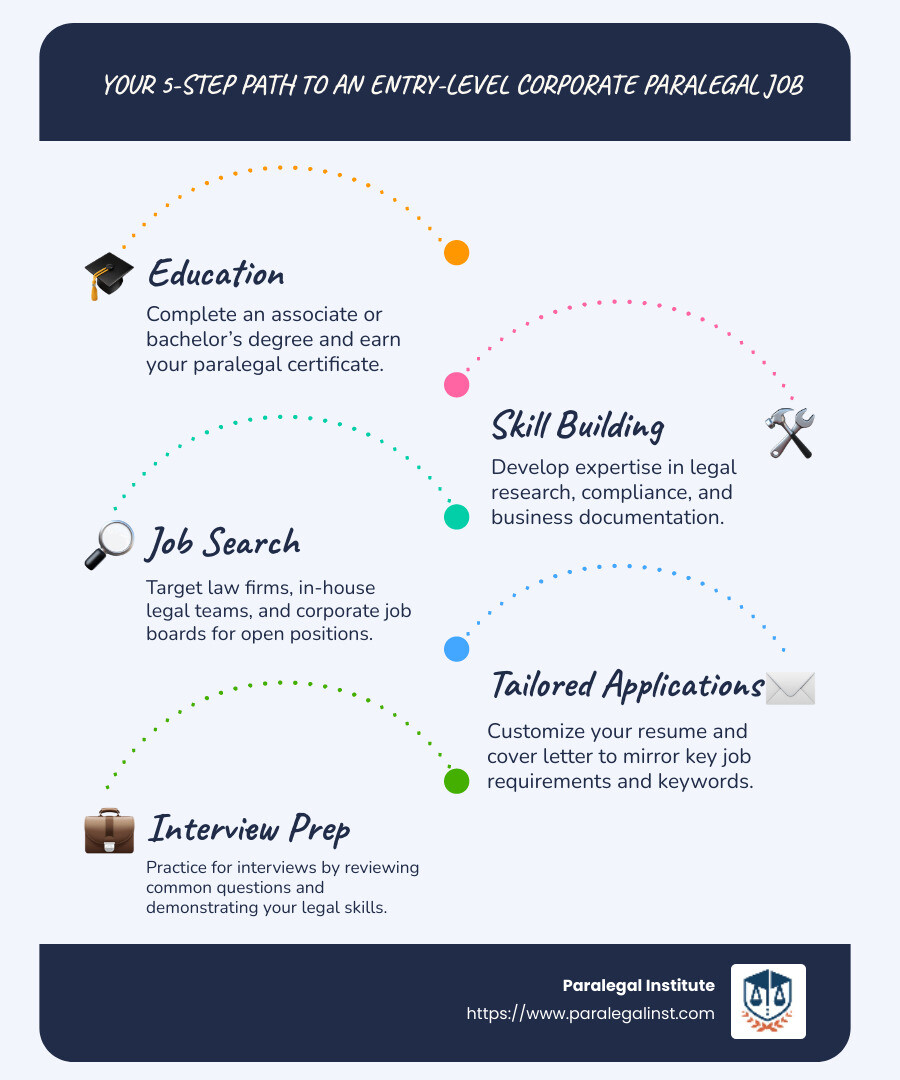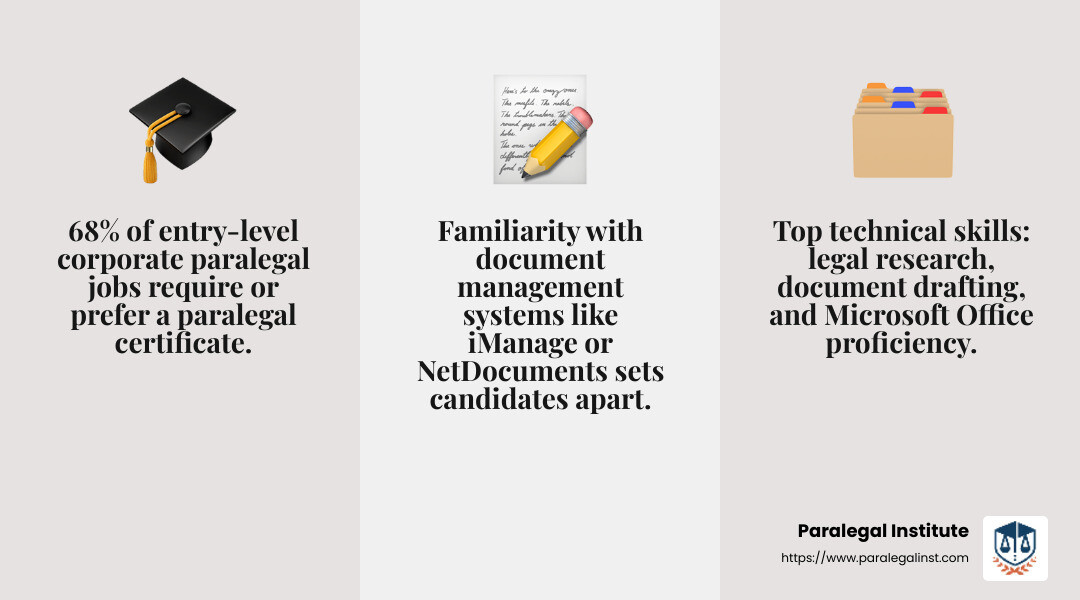Step-by-Step: Securing Your First Corporate Paralegal Job
Breaking into Corporate Paralegal Work: Your Starting Point
So you've set your sights on becoming a corporate paralegal? You're making a smart choice at exactly the right time. The corporate legal world is buzzing with opportunity, and entry level corporate paralegal jobs are more accessible than ever before.
Let me share some exciting news about this career path:
| Quick Facts: Entry Level Corporate Paralegal Jobs |
|---|
| 🔍 Current Openings: 5,000+ positions nationwide |
| 💰 Starting Salary Range:$45,000-$90,000 (varies by location) |
| 📚 Minimum Requirements: Associate's/Bachelor's degree, paralegal certificate preferred |
| 🏢 Top Hiring Industries: Law firms, financial services, healthcare, technology |
| 📈 Growth Outlook: Strong demand due to increasing business complexity |
The journey to landing your first corporate paralegal position combines education, skill-building, and strategic job searching. While the field is competitive, the growing complexity of business regulations means companies need more qualified legal support than ever before.
What makes corporate paralegal work special? Corporate paralegals focus on business transactions, regulatory filings, and maintaining corporate records. This specialized path offers remarkable stability, competitive pay, and clear opportunities to advance your career over time.
Think of corporate paralegals as the essential backbone of legal departments. They handle everything from creating new business entities to supporting complex merger transactions—all while working closely with attorneys who appreciate their expertise.
I'm Matthew Pfau, an attorney who's hired and mentored hundreds of paralegals throughout my career. Now I teach aspiring professionals at Paralegal Institute, helping them prepare specifically for entry level corporate paralegal jobs. My experience on both sides of the hiring desk has given me unique insight into what employers truly value when filling these positions.

In the sections that follow, I'll walk you through exactly what corporate paralegals do, the qualifications you'll need, where to find those first job opportunities, and how to position yourself as a standout candidate. Whether you're fresh out of school or making a career change, this roadmap will guide you toward your first corporate paralegal role.
What Does a Corporate Paralegal Actually Do?
Ever wondered what goes on behind the scenes when companies merge or file their quarterly reports? That's where corporate paralegals shine! Unlike their courtroom-focused counterparts, corporate paralegals are the quiet heroes keeping businesses legally sound and compliant.
A corporate paralegal works as the right hand to attorneys, handling the crucial paperwork and processes that keep companies running smoothly. Think of them as the legal backbone supporting a company's business operations and transactions.
When you land one of those coveted entry level corporate paralegal jobs, you'll likely find yourself handling these core responsibilities:
- Entity Formation and Management: Creating the legal foundation for new businesses by preparing articles of incorporation, bylaws, and maintaining corporate record books
- Corporate Governance: Supporting board meetings by preparing agendas, drafting resolutions, and creating official minutes
- SEC Filings: Helping prepare and file required documents for publicly traded companies, ensuring compliance with securities laws
- Due Diligence: Playing detective during mergers and acquisitions by organizing and reviewing mountains of documents
- Compliance Tracking: Keeping your company out of hot water by monitoring regulatory changes and ensuring deadlines are met
- Contract Management: Drafting, reviewing, and organizing the agreements that define business relationships
According to scientific research on corporate paralegal duties , the role continues to expand as businesses face increasingly complex regulatory environments, making this career path both stable and dynamic.

How Corporate Work Differs from Other Paralegal Tracks
If you're targeting entry level corporate paralegal jobs, understanding how this specialty differs from other paralegal paths is crucial. Corporate paralegal work has its own unique rhythm and focus that sets it apart.
| Aspect | Corporate Paralegal | Litigation Paralegal | Real Estate Paralegal |
|---|---|---|---|
| Primary Focus | Business transactions, corporate governance | Court proceedings, findy | Property transactions, title work |
| Pace | Steady with transaction-based deadlines | Case-driven with court deadlines | Transaction-based with closing deadlines |
| Document Types | Contracts, corporate resolutions, SEC filings | Pleadings, findy requests, court filings | Deeds, leases, mortgage documents |
| Key Skills | Organization, attention to detail, business acumen | Research, writing, procedural knowledge | Title examination, document preparation |
| Work Environment | Often in-house legal departments or corporate law firms | Litigation firms or government agencies | Title companies, real estate firms |
| Client Interaction | Limited, mostly internal business units | Moderate, case-related interviews | High, direct work with buyers/sellers |
The corporate paralegal's day tends to follow a more predictable pattern than litigation work. While litigation paralegals might scramble to meet sudden court deadlines or respond to opposing counsel's motions, corporate paralegals generally work on longer-term projects with more foreseeable timelines. That said, major transactions like mergers can create their own intense "crunch times" where late nights become the norm.
Corporate paralegals also tend to develop deeper business knowledge than their counterparts in other specialties. You'll become familiar with financial terms, business structures, and industry regulations that might never cross a litigation paralegal's desk. This business acumen makes corporate paralegals particularly valuable team members who often understand both the legal and operational sides of a company.
The workflow contrast is significant too. While litigation paralegals focus on the adversarial process leading to settlements or court decisions, corporate paralegals work on transactions and compliance matters where all parties generally share the same goal – closing the deal or maintaining proper corporate standing.
Essential Qualifications & Skills for Entry-Level Success
Looking to land one of those coveted entry level corporate paralegal jobs? You'll need a blend of education, technical know-how, and people skills to stand out from the crowd. Let's break down what hiring managers are really looking for when they review your application.
Educational Requirements
The foundation of your corporate paralegal career typically starts with formal education. While requirements vary by employer, most expect at least an associate's degree, though a bachelor's degree in any field will give you a competitive edge in today's job market.
A paralegal certificate from a respected program is increasingly becoming a must-have rather than just nice-to-have. Our research shows about 68% of corporate paralegal job listings either require or strongly prefer candidates who have completed specialized paralegal training. This credential demonstrates your commitment to the field and provides the practical legal knowledge that employers value.
Understanding business law basics, corporate structures, and regulatory frameworks will also set you apart from other candidates. These fundamentals help you hit the ground running from day one.
Core Technical Skills
When it comes to the nitty-gritty skills you'll use daily, legal research tops the list. Employers expect proficiency with platforms like LexisNexis and Westlaw, which you'll use to research regulations, precedents, and legal questions.
Document drafting is another essential skill – you'll prepare everything from corporate resolutions to basic contracts. This requires meticulous attention to detail, as even small errors in legal documents can have significant consequences.
You'll also need strong Microsoft Office skills, particularly in Word, Excel, PowerPoint, and Outlook. Many corporate paralegals spend hours each day working in these programs, so advanced proficiency is a must. Similarly, experience with document management systems and databases will help you organize and retrieve the mountain of information you'll handle.
Time management rounds out your technical toolkit – you'll need to track billable hours accurately and juggle multiple deadlines without dropping the ball on any of them.

Technical Tools You'll Use on Day One
Walking into your first corporate paralegal position, you'll likely encounter a variety of specialized software tools that might seem intimidating at first. Getting familiar with these before your job search can give you a significant advantage:
Most corporate legal departments rely on document management systems to keep their files organized and accessible. You'll also use e-filing portals specific to your state for business entity filings or the SEC's EDGAR system for public company documents.
During mergers and acquisitions or other major transactions, you'll likely use virtual data rooms such as Datasite, Intralinks, or SharePoint to securely share due diligence documents. And of course, legal research databases like LexisNexis and Westlaw will become your close companions.
"I recommend that aspiring corporate paralegals spend time learning at least one document management system and one entity management platform before applying for jobs," advises Taylor Rodriguez, a corporate paralegal manager. "These technical skills can set you apart from other entry-level candidates."
Soft Skills Hiring Managers Love
While technical skills get your foot in the door, it's often your soft skills that determine long-term success. Corporate paralegals work with everyone from senior attorneys to business unit leaders, making clear communication absolutely essential. You'll need to explain complex legal concepts in straightforward terms and draft concise, professional emails and memos.
Multitasking is another day-to-day reality – you might be updating corporate records, preparing for a board meeting, and responding to urgent compliance questions all in the same morning. This requires not just the ability to juggle multiple projects, but also the adaptability to shift priorities when something urgent lands on your desk.
Given the sensitive nature of corporate information, confidentiality is non-negotiable. You'll be privy to business strategies, potential mergers, and other details that must remain private.
Strong problem-solving skills set exceptional paralegals apart. Rather than simply identifying issues, the best paralegals propose practical solutions and anticipate potential complications before they arise.
At the Paralegal Institute, our 15-week program is specifically designed to build both the technical and soft skills employers seek in entry-level candidates. We focus on practical, hands-on training that prepares you to contribute meaningfully from your first day on the job. For more details on how paralegal education can prepare you for success, check out our Career Paralegal Education resources.
Where to Find Entry Level Corporate Paralegal Jobs
The search for your first corporate paralegal position might feel overwhelming, but with over 5,000 positions currently available nationwide, opportunities are abundant if you know where to look. Let's explore how to steer the job market and find those perfect entry level corporate paralegal jobs that match your skills and career goals.
Using LinkedIn Filters for "entry level corporate paralegal jobs"
LinkedIn has become the go-to platform for legal professionals, but using it effectively requires strategy. When searching for entry level corporate paralegal jobs, start by selecting "Entry level" in the Experience dropdown menu. This simple filter immediately narrows your search to positions appropriate for beginners.
Don't limit yourself to just one search term. Try variations like "corporate paralegal," "legal assistant corporate," or "business law paralegal" to capture different job titles that might offer similar responsibilities. Many employers use different terminology for essentially the same role.
Location flexibility can dramatically increase your options. Consider setting your location to "Remote" or expanding your geographic radius if relocation is possible. According to recent LinkedIn data, approximately 1,759 entry-level corporate paralegal positions are currently listed on the platform, with salary ranges varying significantly by location.
Industries Hiring New Corporate Paralegals
While law firms have traditionally been the primary employers of paralegals, the landscape has expanded considerably. Today's entry level corporate paralegal jobs span across diverse industries, each offering unique advantages for newcomers.
Technology companies have become major players in hiring corporate paralegals. Fast-growing tech firms need support with rapid business expansion, intellectual property matters, and navigating evolving regulations. These environments often offer competitive salaries and modern, flexible work arrangements.
Financial services organizations like banks, investment firms, and insurance companies value paralegals who can support regulatory compliance and transaction documentation. These roles typically provide excellent stability and clear advancement paths.
Healthcare organizations represent another growing sector for entry-level paralegals. Hospitals, pharmaceutical companies, and health insurers need skilled professionals to handle compliance issues, contracts, and corporate governance matters.
Other industries actively recruiting include manufacturing companies (for contract management and environmental compliance), real estate development firms (for entity formation and transaction support), and retail and consumer goods corporations (for contracts and intellectual property protection).
"I initially only applied to law firms because that's what I thought paralegals did," admits Jamal Washington, a biotech company paralegal. "But I found that in-house legal departments were often more willing to train entry-level candidates and typically offered better work-life balance. Don't limit your options by overlooking corporate opportunities."
Job Board Strategies Beyond LinkedIn
While LinkedIn excels for professional networking, diversifying your search across multiple platforms significantly increases your chances of finding the perfect opportunity. Indeed and Glassdoor host thousands of paralegal listings, often capturing positions that might not appear elsewhere.
For specialized opportunities, legal-specific job boards like Law Crossing and Legal Staff feature postings custom specifically to paralegal professionals. Many of these sites allow you to set up email alerts for " entry level corporate paralegal jobs" and related terms.
Don't overlook company career pages. Many large corporations post openings on their websites before listing them on job boards. Create a list of dream companies and check their career pages weekly.
Legal staffing agencies can be particularly valuable for newcomers. Firms like Robert Half Legal, Special Counsel, and Hire Counsel specialize in placing legal professionals and often have exclusive relationships with employers. These agencies can provide temporary positions that frequently convert to permanent roles.
"I found my first corporate paralegal position through a staffing agency," shares Maria Lopez, now a senior paralegal at a technology company. "They placed me in what was supposed to be a three-month contract, but the company offered me a full-time role after just six weeks. Temporary positions gave me a foot in the door when I had limited experience."
Finding your first position is often about persistence and strategic searching rather than luck. By diversifying your approach and remaining consistent in your application efforts, you'll maximize your chances of landing that crucial first role in corporate paralegal work.
Step-by-Step Path to Landing Your First Role
Securing your first corporate paralegal position doesn't happen by chance—it requires strategy, preparation, and persistence. Let me walk you through a practical roadmap that has helped countless Paralegal Institute graduates land their dream jobs.
Step 1: Obtain Your Education and Credentials
Before diving into job applications for entry level corporate paralegal jobs, you'll need to build a solid foundation of qualifications.
Your educational journey typically begins with completing either an associate's or bachelor's degree. While the specific field of study isn't always critical, degrees in pre-law, business, or political science can give you a slight edge.
Next comes your paralegal certificate—a credential that demonstrates specialized knowledge and commitment to the field. Programs like our 15-week curriculum at Paralegal Institute are designed to equip you with practical skills employers value immediately.
"My paralegal certificate program completely transformed my job prospects," shares Carlos Mendez, now working as a corporate paralegal at a financial services firm. "I could speak confidently in interviews about entity formation and contract drafting because I'd actually practiced these skills in my courses."
Consider supplementing your formal education with specialized courses in corporate law, business organizations, or contract drafting. These targeted learning experiences can help you stand out in a competitive job market.
Step 2: Build Your Professional Brand
In today's digital-first job market, your professional presence matters almost as much as your qualifications.
Start by creating or optimizing your LinkedIn profile with relevant keywords, a professional photo, and detailed descriptions of your education. Remember to highlight any relevant coursework or projects that demonstrate your corporate paralegal capabilities.
Clean up your digital footprint by ensuring all public social media profiles present a professional image. That spring break photo from three years ago? Probably time to make it private.
Step 3: Tailoring Your Application for entry level corporate paralegal jobs
Generic applications rarely make it past the first screening. To stand out when applying for entry level corporate paralegal jobs, you need to customize every submission.
Start by carefully reading the job description and identifying key skills, software, and responsibilities mentioned. Then, tailor your resume to reflect these priorities, using the exact terminology from the posting. For example, if the listing mentions "maintaining minute books," use that precise phrase rather than "keeping meeting records."
Your cover letter offers a chance to demonstrate why you're interested in corporate paralegal work specifically. Share what attracts you to business law rather than litigation, and connect your education to the specific needs mentioned in the job posting.
"When I review applications for entry level corporate paralegal jobs, I immediately notice when someone has taken the time to customize their materials," explains Rebecca Chen, a legal department hiring manager. "It shows me they understand what corporate paralegals actually do and are genuinely interested in our specific opening."
Step 4: Building Experience Before You're Hired
The classic catch-22 of job hunting: you need experience to get hired, but how do you get experience without being hired? Here's where creativity comes in.
Internships provide the most direct pathway to relevant experience. Even unpaid or part-time internships with corporate legal departments can provide valuable exposure to the work you'll eventually do professionally.
Volunteering with nonprofit organizations that need help with corporate governance gives you practical experience while supporting a good cause. Many nonprofits need assistance with board minutes, bylaws updates, and compliance tracking.
Consider temporary or contract work through legal staffing agencies. These short-term positions often have lower experience requirements and can lead to permanent opportunities if you impress the team.
Step 5: Networking and Informational Interviews
The old saying that "it's not what you know, but who you know" isn't entirely accurate in legal work—you definitely need solid skills—but connections certainly open doors.
Begin building your professional network by attending paralegal association meetings where local chapters often welcome students and new professionals. These events provide opportunities to meet practicing paralegals and learn about unadvertised openings.
Don't overlook the value of informational interviews—brief, casual conversations with practicing corporate paralegals. These 15-30 minute chats can provide insider knowledge about specific companies and roles while establishing valuable connections.
Step 6: Interview Preparation and Follow-Through
When you secure an interview for an entry level corporate paralegal job, thorough preparation becomes your secret weapon.
Research the company extensively—understand their business model, recent news, and corporate structure. For publicly traded companies, review their annual report. For private companies, explore their website and social media presence.
Prepare specific examples that demonstrate your organizational skills, attention to detail, and interest in corporate law. Even if your examples come from school projects or volunteer work rather than paid experience, concrete situations show how you apply your skills in practice.
Develop thoughtful questions that demonstrate your understanding of corporate paralegal work. Ask about the team structure, typical projects, and growth opportunities rather than focusing immediately on salary or benefits.
After the interview, send personalized thank-you notes to each interviewer within 24 hours. Reference specific topics from your conversation to show you were engaged and attentive.
Landing your first corporate paralegal position is often the biggest hurdle. Once you're in the field with some experience, subsequent career moves typically become much easier. Stay persistent, keep refining your approach, and trust that your preparation will eventually connect you with the right opportunity.
For more guidance on preparing for your paralegal career, explore our resources on how to get your paralegal certificate online.
Day-in-the-Life & Early Career Challenges
Starting your first corporate paralegal job is exciting, but it also comes with a learning curve. Let's take an honest look at what your daily work will involve and the challenges you might face as you begin this rewarding career path.
A Typical Day for an Entry-Level Corporate Paralegal
While no two days are exactly alike in corporate paralegal work, here's what a typical day might look like once you've settled into your role:
Morning:
- 8:30 AM: The day usually begins with checking your email and calendar, creating a priority list for the day's tasks
- 9:00 AM: You'll likely attend a brief legal department meeting to discuss ongoing projects
- 9:30 AM: Time to update the entity management database with recent changes to corporate structures
- 10:30 AM: One of your regular tasks might be drafting board meeting minutes from yesterday's session
- 11:30 AM: Research time! You might spend an hour looking into state filing requirements for a new business entity
Afternoon:
- 1:00 PM: After lunch, you prepare signature pages for contracts that are closing soon
- 2:00 PM: Next up is reviewing a vendor agreement, marking up changes (known as "redlining")
- 3:00 PM: Meet with the attorney you support to discuss upcoming corporate filing deadlines
- 3:30 PM: Organize due diligence documents in the virtual data room for an upcoming transaction
- 4:30 PM: Before wrapping up, you'll log your billable hours and plan tomorrow's priorities

"I love that no two days are exactly the same," shares Sophia Martinez, who's been a corporate paralegal for two years. "Monday I might be completely focused on preparing materials for a board meeting, while Tuesday could involve researching compliance requirements across multiple states for a new product launch. The variety keeps me engaged and always learning."
Overcoming Common Problems
Even the most prepared new paralegals face challenges when starting out. Here are the most common problems and how to overcome them:
Information Overload can feel overwhelming at first. Corporate law comes with its own language and procedures that take time to absorb. Create your own reference guide of terms and processes, and never hesitate to ask questions when you're unsure. Everyone expects a learning period, and it's better to ask than to guess.
Confidentiality pressure is real when handling sensitive corporate information. One misplaced email could have serious consequences. Familiarize yourself thoroughly with your company's confidentiality policies, and when in doubt, always ask before sharing any information, even internally.
Time management becomes crucial when balancing multiple projects with competing deadlines. Develop a reliable tracking system for your tasks and deadlines—whether digital or paper-based—that works for your style.
Technical tool mastery takes time. Most corporate legal departments use specialized software that you'll need to learn while performing your regular duties. Schedule dedicated time to work through tutorials for complex systems, and don't be afraid to ask the IT department for help.
Building Relationships with Attorneys
Your success as a corporate paralegal depends largely on developing strong working relationships with the attorneys you support. This takes time and intentional effort:
Learn individual preferences. Each attorney has their own communication style and work habits. Some want detailed email updates, while others prefer quick in-person check-ins. Pay attention to these preferences and adapt accordingly.
Anticipate needs whenever possible. After working with an attorney for a while, you'll begin to recognize patterns in their requests. The most valued paralegals think ahead and prepare materials before being asked.
Seek feedback regularly. Don't wait for formal reviews to learn how you're doing. Ask specific questions like, "Is there anything I could improve about how I prepared these board materials?" This shows your commitment to growth.
Maintain professional boundaries while being approachable. Find the right balance between friendly rapport and professional distance. Attorneys rely on your discretion and judgment.
Corporate paralegal work can be demanding, especially during major transactions or compliance deadlines when late nights might be necessary. Learning to establish healthy work boundaries early in your career is essential for long-term success. The Building Practical Skills in Paralegal Training program at Paralegal Institute focuses specifically on preparing students for these real-world challenges.
Every experienced corporate paralegal once sat where you are now. With patience, persistence, and a willingness to learn, you'll soon find yourself confidently navigating the corporate legal landscape and ready for new challenges.
Growth, Specialization, and Long-Term Outlook
What happens after you land that first corporate paralegal job? The good news is that your career journey is just beginning, with plenty of exciting paths ahead. Corporate paralegal work offers remarkable growth potential, whether you're looking to climb the ladder, specialize in a niche area, or use your experience as a springboard to other legal careers.
Career Progression Paths
The corporate paralegal career typically follows a clear progression that rewards experience and expertise with increasing responsibility and compensation:
Starting as an Entry-Level Corporate Paralegal, you'll spend your first two years mastering the fundamentals – learning entity management systems, getting comfortable with corporate documents, and building relationships with the legal team. This foundation-building phase is crucial, even if some tasks feel repetitive.
"The first year is like drinking from a firehose," laughs Taylor Rodriguez, who started as an entry-level corporate paralegal five years ago. "But once things click, you begin to see how all the pieces fit together in the corporate legal world."
After gaining experience, you'll advance to Corporate Paralegal II roles (years 2-5), where you'll handle more complex matters with less supervision. By years 5+, Senior Corporate Paralegal positions bring opportunities to manage significant transactions independently and potentially mentor junior staff.
For those with leadership ambitions, the Paralegal Manager/Coordinator role (typically requiring 8+ years of experience) involves overseeing paralegal teams and departmental operations. Some corporate paralegals with 10+ years of experience transition into Legal Operations Manager positions, directing the processes, technology, and staff that keep legal departments running efficiently.
Specialization Opportunities
As your career progresses, specializing in a particular area of corporate law can significantly boost both your job satisfaction and earning potential. These specializations often develop naturally based on your interests and the needs of your organization:
Securities and SEC Compliance specialists become experts in public company filings and regulatory requirements – a high-responsibility role that's always in demand among publicly traded companies.
Mergers and Acquisitions paralegals develop expertise in due diligence, transaction management, and closing processes. These roles often involve exciting, work with significant responsibility.
Other valuable specializations include Corporate Governance(focusing on board matters and corporate record-keeping), Contract Management(overseeing the entire contract lifecycle), Intellectual Property(managing trademark, copyright, and patent portfolios), and International Corporate Compliance(handling entity compliance across multiple countries).
Industry Outlook and Growth Projections
The future looks bright for entry level corporate paralegal jobs and career growth. Several key factors are driving strong demand:
Increasing regulatory complexity means companies need more legal support than ever to steer compliance requirements. As business regulations grow more intricate, paralegals with specialized knowledge become invaluable.
Cost-effectiveness is another driver – corporations looking to manage legal expenses rely on skilled paralegals for work that doesn't require attorney rates. This creates a sweet spot where corporate paralegals can handle substantive work while providing excellent value.
The ongoing expansion of businesses into new markets and product lines generates additional legal support needs. Every new subsidiary, product line, or international venture creates work that corporate paralegals are perfectly positioned to handle.
Perhaps most exciting for new professionals is the remote work flexibility now available in many corporate paralegal roles. The digital change of legal departments means many positions offer hybrid or fully remote options, creating opportunities regardless of location.
According to the Bureau of Labor Statistics, the paralegal profession as a whole is projected to grow faster than average over the next decade, with corporate paralegals particularly well-positioned due to their business knowledge.
Once you've established yourself in the field, additional credentials can improve your expertise and marketability. But timing matters – most professionals should focus on gaining practical experience before pursuing additional credentials.
Frequently Asked Questions about Entry Level Corporate Paralegal Careers
Do I need a law degree to become a corporate paralegal?
Good news! You absolutely do not need a law degree to become a corporate paralegal. In fact, most employers aren't looking for law school graduates for these positions.
What they typically want instead is:
- An associate's or bachelor's degree in any field (business, political science, or pre-law can give you a slight edge, but aren't required)
- A paralegal certificate from an accredited program
- Strong writing, research, and organizational skills
While you might occasionally compete with law graduates in particularly competitive markets, this isn't the norm. Most entry level corporate paralegal jobs are designed for people with paralegal training, not law degrees.
How long does it take to earn a paralegal certificate?
"How quickly can I get started?" is one of the most common questions I hear from aspiring paralegals. The timeline for earning your paralegal certificate varies depending on the program you choose:
Accelerated programs, like our 15-week program at Paralegal Institute, can get you trained and ready in just 3-4 months. Standard programs typically take 6-12 months to complete, while part-time options might extend to 12-18 months if you're balancing work alongside your studies.
Michael Torres, now working as a corporate paralegal at a technology company, shared his experience: "I completed my paralegal certificate in four months while working part-time. The focused curriculum provided exactly what I needed to transition into the legal field without spending years in school."
If you're considering a degree-based program where the paralegal certificate is part of a broader degree, you're looking at 2 years for an associate's degree or 4 years for a bachelor's.
What's the difference between a corporate paralegal and a legal assistant?
The lines between these roles can sometimes blur, especially in smaller organizations where job titles don't always match responsibilities. However, there are typical differences worth understanding when you're searching for entry level corporate paralegal jobs.
Corporate paralegals generally focus on substantive legal work. This includes drafting and reviewing documents, managing entity formations and maintenance, conducting legal research, and supporting compliance efforts. The work requires specialized knowledge and training.
Legal assistants, on the other hand, often handle more administrative tasks like scheduling, filing, document management, and general office support. While still important, these roles typically involve less direct legal work.
My advice? Always read the job description carefully, regardless of the title. Some companies use these terms interchangeably, so understanding the actual day-to-day responsibilities is more important than getting caught up in the job title.
Is remote work common for entry-level corporate paralegals?
The landscape of remote work for paralegals has changed dramatically since 2020, and the good news is that flexible arrangements are increasingly common.
Currently, about 167 of the 5,000+ entry level corporate paralegal jobs nationwide offer fully remote options. Many more positions have adopted hybrid arrangements, typically requiring 2-3 days in the office per week.
That said, remote opportunities are somewhat less common for entry-level positions compared to more experienced roles. Many employers prefer to provide in-person training and mentorship during your first months on the job.
Taylor Johnson, a corporate paralegal at a financial services firm, described a common pattern: "My position began as in-office, but transitioned to a hybrid schedule after my first six months. This is increasingly common as employers see that much of the work can be done effectively remotely once you're fully trained."
If flexibility is important to you, look for employers who advertise hybrid options or mention potential for remote work after an initial training period. The good news is that corporate paralegal work, with its focus on document preparation and research, often transitions well to remote arrangements once you've established yourself.
Conclusion
Starting on the journey to land your first entry level corporate paralegal job might seem daunting, but with the right preparation and approach, you're setting yourself up for a rewarding career with genuine staying power. Throughout this guide, we've walked through the steps to transform yourself from an aspiring legal professional to a competitive candidate employers are eager to hire.
Corporate paralegal careers offer something increasingly rare in today's job market: stability, clear advancement paths, and competitive compensation that grows with your expertise. The skills you develop in this role—attention to detail, critical thinking, and business acumen—will serve you well whether you remain in the paralegal profession or eventually pursue other legal career paths.
As you prepare for your job search, keep these essential takeaways in mind:
Education creates your foundation. A paralegal certificate from an accredited program like the Paralegal Institute's 15-week hands-on curriculum gives you the practical skills employers are actively seeking. This focused education helps you hit the ground running from day one.
Specialization makes you memorable. While you're just starting out, begin thinking about areas where you might eventually specialize—whether that's entity management, SEC filings, or contract administration. Even showing interest in these specialties during interviews sets you apart from generic candidates.
Corporate opportunities extend beyond law firms. Remember to look at in-house legal departments across industries like technology, healthcare, and financial services. These environments often offer better work-life balance and the chance to deeply understand a specific business.
Your network opens doors. The connections you build today—with instructors, fellow students, and working paralegals—can lead to job opportunities tomorrow. Make networking a consistent habit, not a one-time effort.
Business understanding matters. What truly distinguishes successful corporate paralegals is their interest in how businesses operate. Demonstrating this knowledge in interviews shows employers you can think beyond tasks to understand the "why" behind the work.
The path we've outlined isn't just theoretical—it's been traveled successfully by thousands of professionals who started exactly where you are now. By following these steps and continuously building your expertise, you'll be well-positioned to launch a fulfilling career in this dynamic field.
Ready to take the next step? Explore our comprehensive paralegal certificate program designed specifically to prepare you for success in corporate legal environments. Our practical, hands-on approach focuses on the real-world skills that will help you stand out in today's competitive job market and thrive from your very first day on the job.










